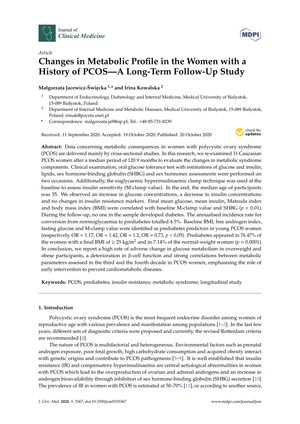TLDR Women with PCOS are at high risk of glucose metabolism issues and heart diseases, especially if overweight, highlighting the need for early intervention.
The study "Changes in Metabolic Profile in the Women with a History of PCOS—A Long-Term Follow-Up Study" followed 31 Caucasian women with polycystic ovary syndrome (PCOS) for a median period of 120.9 months. The study found an increase in glucose concentrations, a decrease in insulin concentrations, and no changes in insulin resistance markers. No one developed diabetes, but the annualized incidence rate for conversion from normoglycemia to prediabetes was 4.5%. Prediabetes predictors in young PCOS women were identified as baseline body mass index (BMI), free androgen index, fasting glucose, and M-clamp value. Prediabetes appeared in 76.47% of the women with a final BMI of ≥ 25 kg/m² and in 7.14% of the normal-weight women. The study concluded that there is a high rate of adverse change in glucose metabolism in overweight and obese participants, a deterioration in ß-cell function, and strong correlations between metabolic parameters assessed in the third and the fourth decade in PCOS women. This emphasizes the role of early intervention to prevent cardiometabolic diseases.
 308 citations
,
December 2018 in “PLOS Genetics”
308 citations
,
December 2018 in “PLOS Genetics” The research found that PCOS has common genetic factors regardless of how it is diagnosed and is linked to metabolic and reproductive issues.
317 citations
,
April 2018 in “Journal of steroid biochemistry and molecular biology/The Journal of steroid biochemistry and molecular biology” PCOS is a complex condition in women that can lead to health issues, and lifestyle changes are the best management approach.
 189 citations
,
March 2018 in “Human Reproduction Update”
189 citations
,
March 2018 in “Human Reproduction Update” Women with PCOS are more likely to have impaired glucose tolerance and type 2 diabetes, especially if they are Asian or obese.
 767 citations
,
September 2016 in “Human Reproduction”
767 citations
,
September 2016 in “Human Reproduction” Polycystic ovary syndrome affects about 6-10% of women, with varying symptoms and the need for standardized global definitions.
 222 citations
,
January 2014 in “International journal of reproductive medicine”
222 citations
,
January 2014 in “International journal of reproductive medicine” Insulin resistance and obesity are key factors in the development and worsening of polycystic ovary syndrome, and lifestyle changes are important for managing it.
 926 citations
,
June 2010 in “BMC Medicine”
926 citations
,
June 2010 in “BMC Medicine” Polycystic ovary syndrome is a complex condition that affects women's mental, reproductive, and metabolic health throughout their lives.
 4809 citations
,
January 2004 in “Fertility and Sterility”
4809 citations
,
January 2004 in “Fertility and Sterility” The 2003 consensus updated PCOS diagnosis criteria and highlighted increased risks of diabetes and heart disease for those affected.
 July 2023 in “Journal of Clinical Medicine”
July 2023 in “Journal of Clinical Medicine” Tirzepatide might help manage PCOS in obese patients but needs more research to confirm safety and effectiveness.
 26 citations
,
June 2014 in “Fertility and Sterility”
26 citations
,
June 2014 in “Fertility and Sterility” Teens with PCOS and a mom with PCOS have higher insulin resistance and lower adiponectin levels, which could signal early metabolic problems.
 29 citations
,
January 2011 in “Journal of Obstetrics and Gynaecology”
29 citations
,
January 2011 in “Journal of Obstetrics and Gynaecology” Insulin resistance in women with PCOS can lead to serious health issues, but lifestyle changes and certain medications can help manage symptoms.
 100 citations
,
June 2002 in “Diabetologia”
100 citations
,
June 2002 in “Diabetologia” Parents of women with PCOS have a higher risk of Type II diabetes and insulin resistance, especially fathers.
 19 citations
,
March 2007 in “Journal of diabetes science and technology”
19 citations
,
March 2007 in “Journal of diabetes science and technology” Rosiglitazone may be better than metformin for insulin resistance in PCOS, but more research is needed on certain biomarkers.











